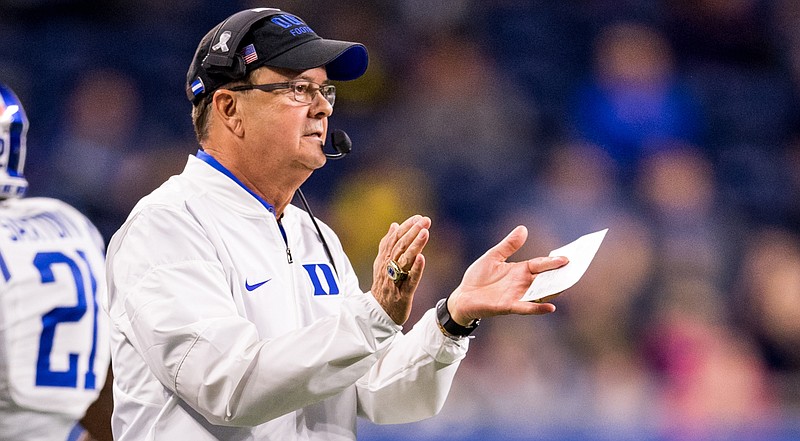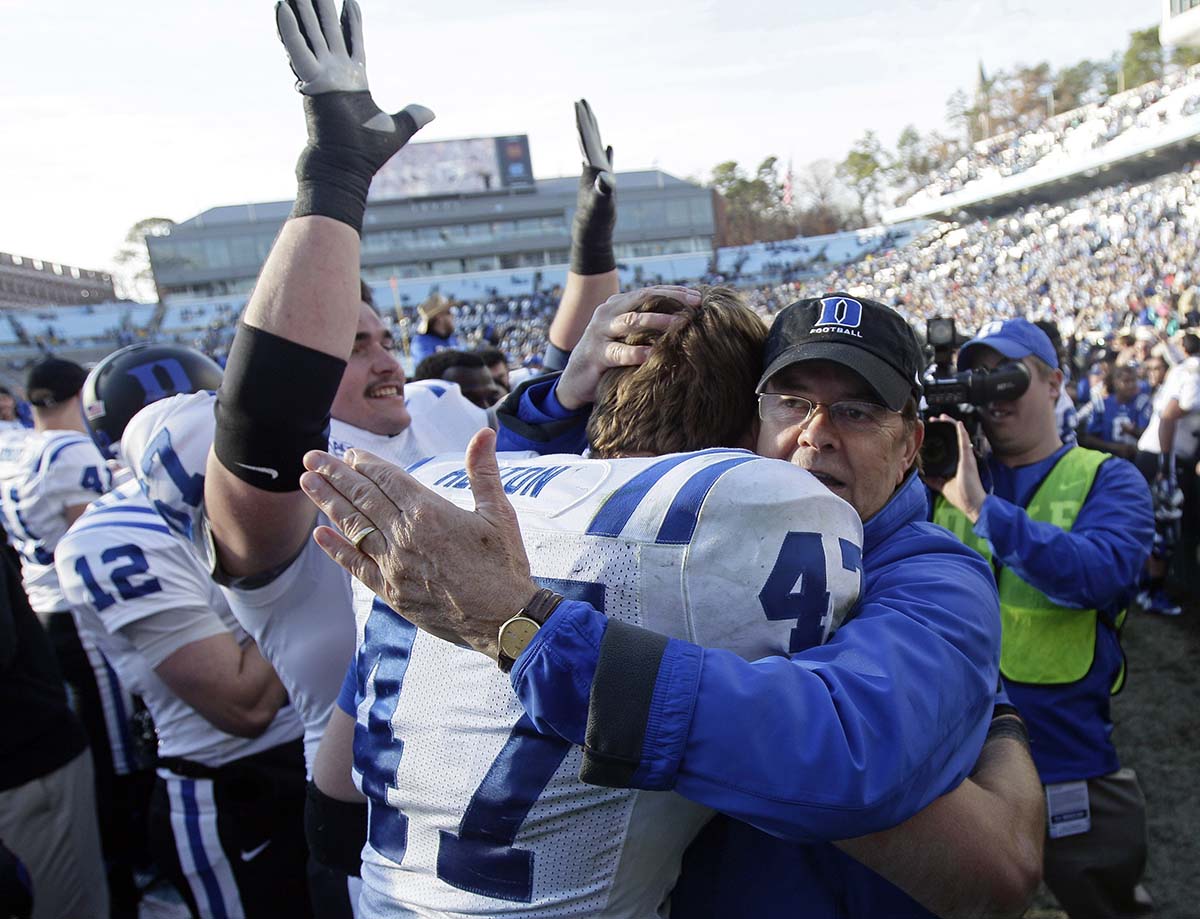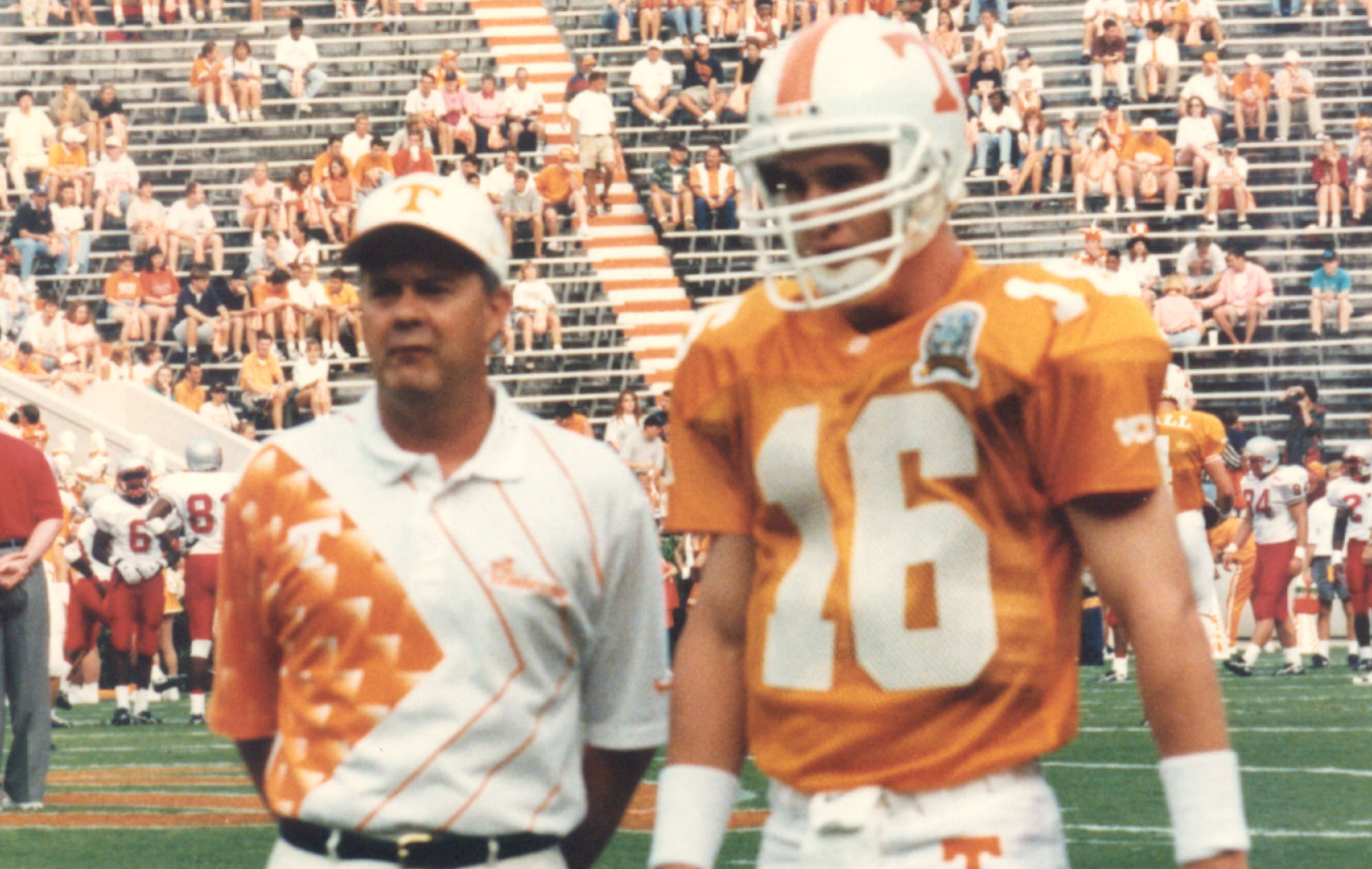Mention the very first night of 1986, and the memories rush back to the forefront of David Cutcliffe's mind.
Before serving as Peyton Manning's offensive coordinator at Tennessee and as Eli Manning's head coach at Ole Miss, Cutcliffe was the tight ends coach under Johnny Majors for the 1985 "Sugar Vols," who earned that nickname by winning the program's first Southeastern Conference title since 1969 before thrashing No. 2 Miami 35-7 at the Sugar Bowl in New Orleans.
"That Miami team was one of the most talented teams in the history of college football, and we beat them badly," Cutcliffe said at the recent SEC media days event in Atlanta. "Jeff Smith was our tight end and played a big role. We came up with a schematic thing about splitting him out and moving him around, and they never adjusted very well.
"Ken Donahue put a defensive masterpiece together to just blow Vinny Testaverde, Alonzo Highsmith and all those great players out of the water. We finished No. 4, but we may have been the best team in the country at the end of that season."
For those too young to remember the "Sugar Vols," there was also Tennessee's 1998 national championship run in which Cutcliffe was Phillip Fulmer's offensive coordinator. The most memorable play from that season was defensive tackle Billy Ratliff causing the Clint Stoerner fumble that abruptly swung the momentum and enabled the Volunteers to pull out a 28-24 win over Arkansas in Knoxville.
The Razorbacks were leading 24-22 at the time of Stoerner's miscue, and there was still the matter of Tennessee being at the Arkansas 43-yard line with 1:43 remaining.
"I remember Phillip saying, 'We've got to hurry up and get down the field. We've got to throw the ball,'" Cutcliffe said. "I said, 'We're not throwing a single pass. We're going to run power and isolation. We're going to give the ball to Travis Henry, and we're going straight down to score. No excuses. No regrets.'
"Our players really executed. I don't know if Phillip would have fired me or not if we didn't score."
Cutcliffe, who has tales spanning 40 years of college coaching, is now a special advisor to SEC commissioner Greg Sankey for football relations. The 67-year-old views himself as a "conduit" between the conference office and the league's 14 coaches, adding that he will be an advocate for the coaches.
Maintaining traditions that have dwindled or disappeared in college football due to conference realignments and an expanded postseason is a challenge he is more than willing to accept, even though it may be a battle that already has been lost in many aspects.
"We owe it to the fans of the game and the players of the game to really get a grip on just how important is an alliance or the money," Cutcliffe said. "We've still got a chance to win this game in the fourth quarter."
A STRANGE NIGHT
Cutcliffe guided Duke to six bowl games in a seven-year stretch from 2012-18, with his 2013 Blue Devils reaching the Atlantic Coast Conference championship contest behind leading tackler and Baylor School alum David Helton. His final two teams in Durham, however, stumbled to a combined 5-18 record.
The outbreak of the coronavirus in March 2020 helped seal his fate.
"Our players left March 6 and were not allowed to return until the end of July," Cutcliffe said. "Our opponents went back on June 1. It was a private university decision, and I didn't get our coaches back until the start of July.
"It was probably a two-year setback, because we had players who didn't like that and transferred."
The departure from Duke was not the most emotional of his career. That honor goes to leaving Tennessee after the 1998 SEC championship triumph over Mississippi State and missing the 23-16 victory over Florida State at the inaugural Bowl Championship Series title game at the Fiesta Bowl.
In between, Cutcliffe replaced Tommy Tuberville at Ole Miss and guided the Rebels to a 27-25 topping of Oklahoma in the Independence Bowl.
"I walked in with tears down my face in my last meeting at Tennessee," he said. "The previous coach at Ole Miss had kind of left in the middle of the night, so they had accepted a bowl game and had nobody to coach it. Those kids were decimated, and they had been thrilled to get to that point coming off probation.
"Their AD asked me to coach the team, so how do you say, 'No?' It's your job, and you're now their head coach."
Cutcliffe told the Tennessee players that they were going to win out in Arizona and that Randy Sanders was going to call a good game. He studied video of the Seminoles during that stretch and sent his thoughts to both Fulmer and Sanders.
Four nights after coaching Ole Miss to its bowl win, Cutcliffe sat by himself in Oxford and watched his former team win the program's first national title since 1951.
"I had an out-of-body experience," he said. "I felt like I was floating above that game and hovering over that stadium. It all worked out, and we won a thrilling game, but that was the hardest message I've ever had to deliver to a football team. We didn't have any holdovers on that Ole Miss staff. They had all gone to Auburn.
"You've brought up something that doesn't get asked very often, and my palms are sweating right now because it was such an intense time in my coaching life."
SPEAKING OUT
Life has come full circle for Cutcliffe, who was born and raised in Birmingham and competed inside Legion Field when he played for Banks High School. Peyton Manning's performances against Alabama, Cutcliffe's alma mater, at Legion Field in 1995 and 1997 give him two more reasons to smile when he sees the outdated facility driving to and from work.
"When David and I first visited, it was by Zoom, and then we had a longer visit in person," Sankey said. "We talked about change and how we needed help within the boundary lines of the playing field and what changes in recruiting could mean. He's been there, and I had him with me in the meeting of our 14 head coaches right at the start of our Destin (Florida) time together, which obviously followed a bit of offseason stress.
"There is nothing wrong with change, but we don't just want to change for change sake. We don't want to expand for a number. We want to expand for a reason, and part of David's value is that he's been on the road recruiting, and he's been in the locker room after the incredible victories and the humbling defeats. He's been on the sideline, and he's been in the press box, and we really need that perspective in our office."
Cutcliffe is supportive of the transfer portal as well as name, image and likeness opportunities, though he is vehemently against them being used as inducements on the recruiting landscape. As for college conferences that soon will range from New Jersey to California (Big Ten) and from Florida to Utah (Big 12) - well, don't get him started on that one.
"If you're a football coach and you've got to take a team across the country and don't have an open date on the other end of it, that can cost you two games," Cutcliffe said. "You may think it's going to better your league when in fact it may eliminate you in many ways. We played UCLA at night (in 1994) when Jerry Colquitt got hurt, and Phillip had set up for me and (defensive coordinator) Larry Marmie to fly back private through the night, and I went straight to the office.
"We had to play at Georgia with a new quarterback, Todd Helton, who had been in New Haven (Connecticut) all summer playing in a wood bat league. If I had not been on that private plane, there is no way we would have been prepared to beat Georgia at Georgia. All of that matters."
Those who savor the tradition aspect to the sport still have hope. Whether or not Cutcliffe prevails on that front remains to be seen, but at least he is coming out swinging in his new role.
"We want to talk about mental health and physical well being, but if you put somebody on two long flights, you're struggling with dehydration, which affects concussions," he said. "I hear all this stuff, but I'm not seeing it. I don't mind speaking out about this mega expansion, because I don't think it's healthy.
"If I have to go around the South telling stories about how it used to be and talk to them about the rich traditions - I know those things, and we'll see what happens."
Contact David Paschall at dpaschall@timesfreepress.com. Follow him on Twitter @DavidSPaschall.


